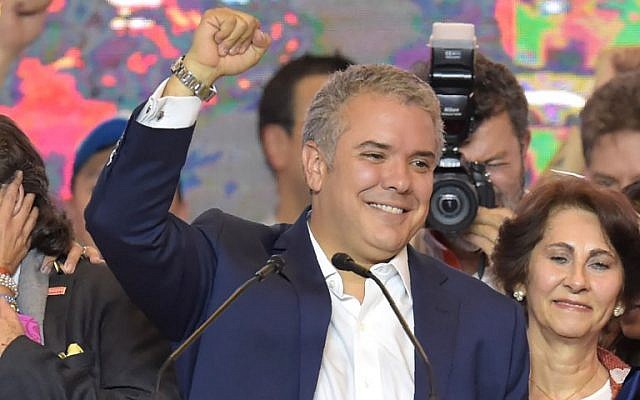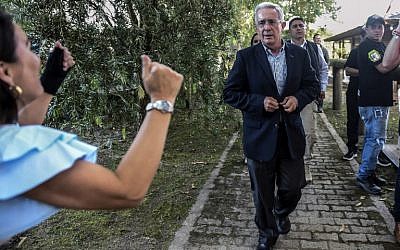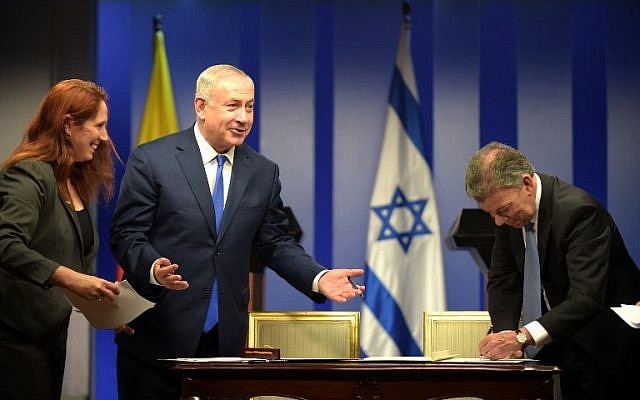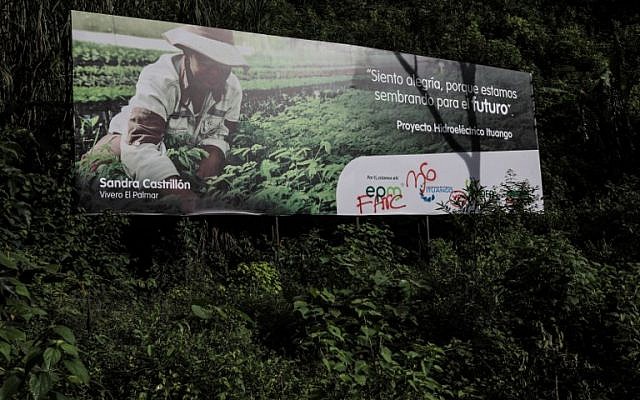

New Colombian president open to moving embassy to Jerusalem
Ivan Duque, who said he wanted to have the best possible ties with Israel, defeats leftist challenger, though some see seeds of political shift for conservative country
Today, 5:23 am
The newly elected Colombian president said recently he would be open to moving the country’s embassy to Jerusalem, potentially becoming the fourth country, and third from Latin America, to do so.
Conservative Ivan Duque won just over 54 percent of the vote, beating out leftist rival Gustavo Petro’s, who took 41.7% with nearly all the votes counted, electoral authority figures showed Sunday.
On May 16, Duque said at a campaign event that if elected he would not rule out “the possibility of placing the diplomatic seat in Jerusalem.”
The comment, made at an event with local churches, garnered cheers and applause at the time.
Duque also said he wanted to “maintain the best possible relations with the state of Israel.”
The statement came on the same day Guatemala became the second country to move its embassy to Jerusalem, two days after the US. A week later, Paraguay became the third country to do so.
The comments from Duque garnered a harsh backlash from his opponents on the campaign trail, with most other candidates rejecting the position, according to Colombian news site El Nuevo Siglo.
Questioned about his statement days later, Duque clarified to local radio station Caracol that he supported a two-state solution and wanted his eventual government to contribute to peace efforts.
“Colombia cannot stir up hatred in the Middle East,” he said.
Duque’s opponent Gustavo Petro had been a vocal opponent of the US decision to recognize Jerusalem as Israel’s capital, and accused the IDF of carrying out a “massacre” against Gazans during border protests against the embassy transfer on May 14.
In 2010 and 2011, Duque’s served as an assistant to Uribe in a UN probe of the 2010 Mavi Marmara flotilla incident, in which Israeli solders scuffled with Turkish protesters trying to break the Gaza blockade.
The panel ultimately found that Israel’s blockade on Gaza was legal, but the raid, in which 10 Turkish activists were killed, was excessive.
Throughout his campaign, Duque was dogged with accusations that he would be little more than a puppet for Uribe, who is constitutionally barred from seeking a third term.

Duque is the son of a former governor and energy minister who friends say has harbored presidential aspirations since he was a child. The father of three ago entered public service almost two decades ago as an adviser to then Finance Minister Juan Manuel Santos, whom he will succeed as president.
Duque later moved to Washington, where he spent more than a decade at the Inter-American Development Bank, first as an adviser for three Andean countries and later as chief of the cultural division.
Under outgoing President Juan Manuel Santos Colombia has become one of Israel’s best friends in Latin America. Prime Minister Benjamin Netanyahu visited the country during a swing through Latin America in 2017.
In October 2012, Santos said that the world should recognize Israel as the state of the Jewish people.
“There have been strong relations between the two countries. Colombia is among the few Latin American countries that did not vote in favor of upgrading ‘Palestine’ as a non-member state at the UN a few years ago,” Hebrew University’s Arie M. Kacowicz, an expert on Latin America, said last year.


Colombia, which fought an insurgency by FARC rebels for decades until a peace treaty signed in 2016, regularly purchases Israeli arms.
Leah Soibel, the founder and of Fuente Latina, an organization promoting stronger ties between Israel and Latin America, said last year that relations between the country were ripe for expanding.
“Colombia has traditionally been Israel’s strongest partner in the region regarding military and security ties,” she said.
During Netanyahu’s visit, Foreign Ministry director Yuval Rotem expressed hopes that Israel could transition its trade relationship with Bogota into infrastructure projects following the peace deal.
“There are many projects that the ministry of post-conflict is trying to promote and we believe that, in a modest way, we can be also a part in this journey,” he said at the time.
However, with Duque’s election, the historic peace with FARC and efforts to integrate the former rebels into society has now been thrown into doubt.
Colombia’s peace process to end a conflict that left more than 250,000 people dead is considered largely irreversible. Most of the more than 7,000 rebels who have surrendered their weapons have started new lives as farmers, community leaders and journalists. Last year the rebels launched a new political party and will soon occupy 10 seats in congress.
But the accord remains contentious and Duque pledged throughout his campaign to make changes that would deliver “peace with justice.” Through constitutional reform or by decree, he could proceed with proposals such as not allowing ex-combatants behind grave human rights abuses to take political office until they have confessed their war crimes and compensated victims.
“The peace we all dream of demands corrections,” Duque told hundreds of jubilant supporters late Sunday. “So that victims are the true center of the process and so that there is justice, reparations and no repetition.”
The current agreement allows most rebels to avoid jail, a sore point for many.
“The rebels are going to get 10 seats in congress without having made reparations to victims or turned over information on drug trafficking routes,” said Felipe Ramirez, 29, a veterinarian who voted for Duque. “That’s a bad precedent because other criminal groups will want the same.”


Duque’s detractors warn that his victory could throw an already delicate peace process into disarray.
“I think it will set up a big constitutional battle,” said Cynthia Arnson, director of the Latin America program at the Woodrow Wilson International Center for Scholars.
Analysts also saw the possible seeds of a shift left for the conservative country with the success of Petro, the first left-wing candidate to make a run-off in decades.
Petro energized young voters and drew millions to public plazas with his fiery speeches vowing to improve the lives of poor, disenfranchised Colombians.
And though he failed to catch Duque, his more than 8 million votes marked the biggest ballot box success for a leftist presidential contender yet in a country where leftist politicos have long been stigmatized over fears of potential ties to guerrilla causes.





